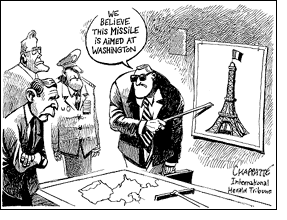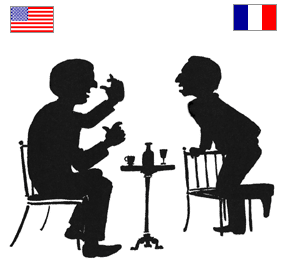At the breakfast table, around the time of the American invasion of Iraq,
my 11-year-old French grandson looked at the morning newspaper with a
worried face and then asked me, "Mima, when are the Americans going to
bomb France?"
 A few days later, a cartoon in the International Herald Tribune portrayed
a CIA agent briefing President Bush. Pointing at the Eiffel Tower, he
said, "We believe this missile is aimed at Washington." Funny, sort of.
A few days later, a cartoon in the International Herald Tribune portrayed
a CIA agent briefing President Bush. Pointing at the Eiffel Tower, he
said, "We believe this missile is aimed at Washington." Funny, sort of.
Not any more. American degrading and demonizing of the French, online
and in the media, has become routine. The two countries, old friends and
loyal allies for 200 years, have had spats continually for lots of good
cultural reasons which have to do both with similarities -- rivalry --
and differences. Like an old married couple, they always kissed and made
up; the basic tissue of fondness and mutual respect was never really threatened.
Among Americans, if French bashing was rampant, it used to be done behind
closed doors with a certain amount of shame and restraint. The bashers,
educated adults aware of France's august past of military superiority
and crucial contribution to America's War of Independence, as well as
a beacon of artistic and scientific innovation, understood the possibility
that they themselves might be the problem -- that perhaps they had a skewed
perception of these people who confounded them. These were often business
people transferred to France who had had no previous exposure to France
or to the French language and were feeling as helpless as babies. They
were courteous, what used to be called well brought up, and -- except
for Mark Twain -- hesitated to condemn a whole culture on the flimsy basis
of their own ignorance and personal feelings. With a little cross-cultural
nudging they saw that indeed they had been looking through the wrong end
of the telescope. Once you absorbed the French cultural differences, you
understood that within their own parameters they made sense. These Americans
learned to appreciate the French and recognize their right to their own
opinions, strategies and ways of doing things.
All that has changed. It is now open season on the French. Never mind
that the French were right about Iraq's lack of weapons of mass destruction.
Never mind that the aftermath of the invasion turned into the nightmare
the French predicted and that the French have stoically contained their
I-told-you so's. Nevertheless, because France did not go along with the
invasion, and did what they could to postpone it, they are now condemned
to the sewer. There is no discussion, no discourse, no right of appeal.
And not just condemned without a hearing: they are ridiculed, insulted,
smeared with slime, defiled with muck.
It is true that lately both governments have been speaking more softly
about and even to each other. And a few days ago, President Bush himself
picked up the phone and had a talk with President Chirac of France, something
unthinkable even a few weeks ago.
It is also true that the peoples of both countries have cooled off. From
the beginning the French have been nonchalant about this present friction.
They like Americans and don't hesitate to say so, making it clear that
it is the present Administration in Washington they have problems with.
Americans have by now forgotten about freedom fries and the urge to dump
French products onto the street. Now as before, Americans who have visited
France almost always come back bubbling over with the kindness of the
French and with the fun of eating wonderful food while discovering treasures
of the French countryside and museums.
Mark Johnson, a Cornell biology major from Syacuse, NY, on an exchange
program in Paris, said he was stunned by the niceness of French people
and the trouble they took to listen to his French.
"I thought they'd go straight to English when they heard my stumbling
use of their language, but they were pleased that I tried, and did all
they could to encourage me," he said. "It's funny that they don't smile
at strangers on the Métro -- I'm not used to that, even though I come
from New York, but I figure it's just not their way. What is nice is that
when they hear your accent and find out that you're American, they're
curious about everything and ask all sorts of questions."
Gene Weingarten, the Washington Post humor columnist, went to France on
an assignment to search for the typical "arrogant, cold, rude Frenchman."
He couldn't find one. The ones he found were all charming to him.
Rosine Evans, a petite blonde, pretty, elegant and smart, the way only
the French make them -- pert comes to mind -- who has lived in Seattle
for ten years with her English husband and loves it, is impressed by how
open Americans are to revising their prejudices.
"Take the American reaction to the new French law banning -- in state
schools -- the head scarf worn by Moslem women", she says. "At first they
are adamant about its invasion of personal liberty. But they quickly see
the point when you explain to them that there are 6 million Moslems in
a country of 60 million, threatening to become a state within a state
if allowed to follow their own, rather than French laws.... and that the
law is life-giving to many young Moslem women who long to integrate in
France and hate the scarf but are obliged to obey their father or brother,
or be subjected to violence and perhaps death."
Rosine, named for the heroine in the opera "The Barber of Seville", notices
a vast difference in American opinions of the French before and after
a trip there.
"When normal American people say bad things about the French, it is always
because they haven't been there," she says. "So whenever I hear of friends
planning a trip, I organize tea or lunches with my French friends in Paris.
The Americans always came back transformed."
Yes, but open a newspaper in America or tune into a late-night comedian
on the television and you'll be bombarded with the same anti-French sleaze
that began making the rounds after the Iraq invasion. Surf the bloggers
and it's worse. Unprintable, in fact. In between their four-letter words
about the French, they repeat over and over how "ungrateful the French
are after having been saved by the US in two world wars." Invariably they
say that the fact that America helped them out in two world wars gives
the US the right to lead them blindly wherever it wants, forever.
Frenchmen like author Antoine Audouard visit New York and are bowled over
by American hostility in the media. In a January article in the New York
Times with the headline "Behind Enemy Lines," Audouard describes an ad
on a bus shelter for the History Channel's current series about the French
Revolution: "For Two Hours, It Won't Kill You to Love the French."
"It has become fashionable -- even commonplace -- in the American media,"
he writes, "to associate the French with things cowardly, despicable,
unfaithful, ungrateful or foulsmelling ... Here in the country of political
correctness, where the mainstream press treads on eggshells when talking
about race, nation or ethnicity, French-bashing, it would seem, has become
politically correct.
Audouard finds that while it is one thing to disagree with another country's
politics, a "generalized expression of contempt or hatred for a society,
its history, its culture and its people" is disgraceful.
"Americans themselves," he writes, "are sometimes confronted with this
kind of absurd hostility abroad. Of all nationalities, they should be
the first to stay away from it. After all, diversity and respect for other
cultures are among the core values on which America was founded -- and
by which Americans thrive."
And now a book has come out -- published by Doubleday! -- called "Our
Oldest Enemy". The authors are a polemicist with the National Review,
John J. Miller, and a professor at Seton College, Mark Molesky. The book
has provoked disgust among critics. Two eminent professors, scholars of
France and authors of books about it, Stanley Hoffman of Harvard, and
Robert Paxton of Columbia have condemned it to the trash can. "Readers
looking for reasons to hate the French, who tolerate selective and slanted
scholarship, will applaud," wrote Paxton. In Foreign Affairs (Nov-Dec
2004), Hoffman wrote: "That a book as biased and shoddy as this one should
be published by a reputable press is eminently regrettable."
France's most popular philosopher, Bemard-Henri Lévy, regretting
the book's portrayal of his countrymen as "corrupt, crafty, insidious,
lascivious, stingy and cunning," calls it a "mad charge against a diabolical
nation, the incarnation of evil, bearing in the body and soul of its citizens
the stigmata of an ill will the only aim of which throughout the centuries
has been the humiliation of America the great."
Lévy recognizes that one of the causes of friction between the
two countries is rivalry: France and the US, he says, "both literary nations
convinced of their special link to the Universal, cannot let this sinister
copycatting in which the only stakes are the grand prize for stupidity,
continue."
Edward C. Knox, professor emeritus of French at Middlebury College and
author of several studies on how Americans look at France, agrees that
the special feelings of exceptionality of France and of the US are a big
reason for suspicion of each other.
"Both countries believe they have a mission to tell other countries how
to live and behave," he said in an interview. "But both see the other
acting out of its own interests. Neither country is willing to see its
interests as solely its interests, rather than a crusade for liberty and
democracy, or the reign of reason and civilization, etc. How could there
not be tension?"
The list of areas of contention between the two countries is dense and
endless (see my article Roots of
Franco-American Friction) and yet, there is so much in common
... above all, humanitarian goals for mankind and the belief in the rule
of law as the basis of democracy.
"The two countries will grow together again," said Jacques Andreani, former
French Ambassador to the US and author of a book about America, "but it
will take time, much time."
Reprinted from the the Spring/Summer 2005 Alliance Française
publication Le
magazine. Illustration copyright © Polly Platt.
Cartoon © Chappatte in International Herald Tribune - www.globecartoon.com
|

 A few days later, a cartoon in the International Herald Tribune portrayed
a CIA agent briefing President Bush. Pointing at the Eiffel Tower, he
said, "We believe this missile is aimed at Washington." Funny, sort of.
A few days later, a cartoon in the International Herald Tribune portrayed
a CIA agent briefing President Bush. Pointing at the Eiffel Tower, he
said, "We believe this missile is aimed at Washington." Funny, sort of.